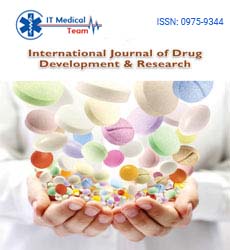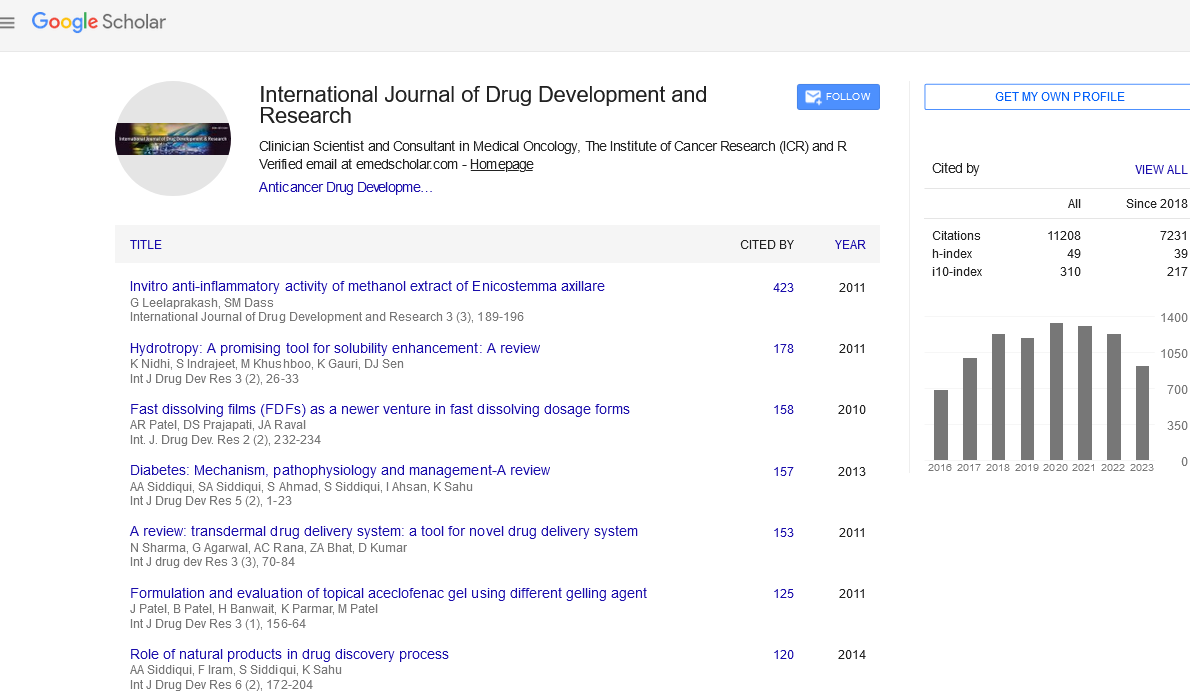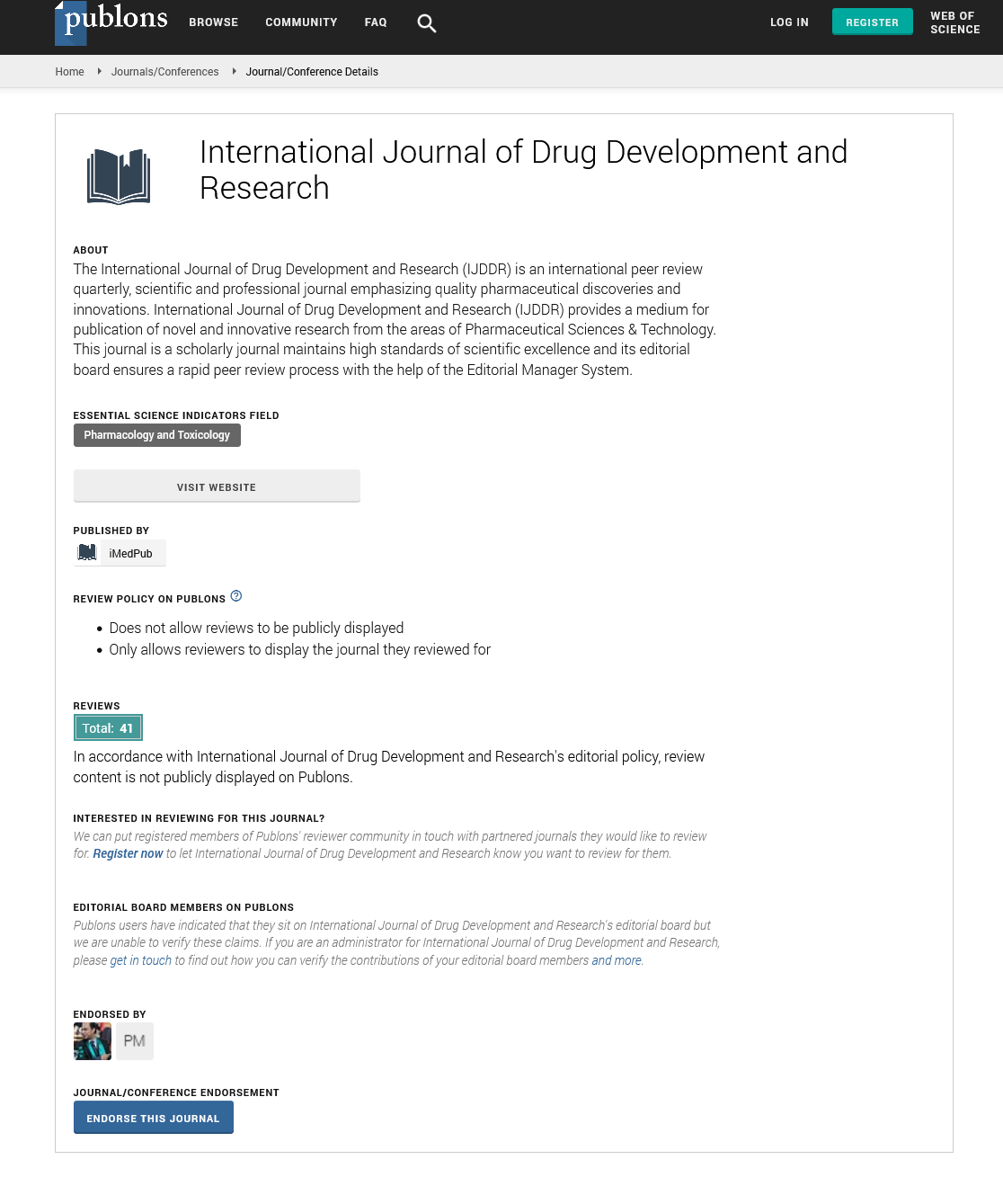Opinion - (2024) Volume 16, Issue 3
Unveiling the Synergy: Artificial Intelligence and Drug Development
Jaawk Deruiter*
Department of Pharmacy, National University of San Luis, San Luis, Argentina
*Correspondence:
Jaawk Deruiter, Department of Pharmacy, National University of San Luis, San Luis,
Argentina,
Email:
Received: 14-May-2024, Manuscript No. IJDDR-24-14791;
Editor assigned: 16-May-2024, Pre QC No. IJDDR-24-14791 (PQ);
Reviewed: 30-May-2024, QC No. IJDDR-24-14791;
Revised: 07-Jun-2024, Manuscript No. IJDDR-24-14791 (R);
Published:
13-Jun-2024
Introduction
In the ever-evolving landscape of healthcare, the integration
of Artificial Intelligence (AI) has emerged as a transformative
force, revolutionizing various aspects of medical research and
drug development. At the intersection of AI and
pharmaceuticals lies a realm of unparalleled opportunity, where
advanced algorithms and machine learning techniques are
unlocking new insights, expediting processes, and redefining the
possibilities of therapeutic innovation. This article delves into
the symbiotic relationship between AI and drug development,
exploring how AI is reshaping the pharmaceutical industry and
propelling us towards a future of personalized medicine and
accelerated discovery.
Description
Harnessing big data
At the heart of AI-driven drug development is the ability to
harness vast amounts of data with unprecedented speed and
efficiency. The pharmaceutical industry generates an immense
volume of data from diverse sources, including genomic data,
clinical trial data, electronic health records, and scientific
literature. Traditional methods of data analysis often struggle to
cope with the complexity and scale of this data deluge. However,
AI algorithms excel in processing, analyzing, and extracting
meaningful insights from big data sets, enabling researchers to
uncover hidden patterns, identify novel drug targets, and predict
drug responses with greater accuracy.
One of the key areas where AI is making a profound impact is
in the identification and validation of drug targets. By analyzing
genomic data, protein structures, and molecular interactions, AI
algorithms can identify potential targets for therapeutic
intervention, guiding researchers towards promising avenues for
drug discovery. Moreover, AI-powered predictive modeling
enables the simulation of drug-target interactions and the
prediction of drug efficacy and safety profiles, helping to
prioritize candidate compounds for further development.
Accelerating drug discovery
Traditional drug discovery is a time-consuming and costly
process, often taking years and billions of dollars to bring a new
drug to market. AI is poised to revolutionize this paradigm by
accelerating the drug discovery process and reducing the time
and resources required to develop new therapies. Machine
learning algorithms can analyze vast libraries of chemical
compounds, predict their properties and activities, and suggest
potential drug candidates for further experimental validation.
Furthermore, AI-driven drug design platforms enable the
rapid exploration of chemical space, allowing researchers to
design and optimize drug molecules with desired properties.
This iterative process of virtual screening, molecular modeling,
and optimization accelerates the identification of lead
compounds and streamlines the development of novel
therapeutics.
In addition to speeding up the discovery of small molecule
drugs, AI is also transforming the field of biologics development.
By analyzing protein sequences and structures, AI algorithms can
predict the properties and functions of biologic drugs, optimize
protein engineering strategies, and design novel biologic
therapeutics with enhanced efficacy and reduced immunogenicity.
Personalized medicine and precision treatment
One of the most promising applications of AI in drug
development is the realization of personalized medicine and
precision treatment approaches. By leveraging AI algorithms to
analyze patient data, including genetic information, biomarker
profiles, and clinical outcomes, researchers can identify
subpopulations of patients who are most likely to benefit from
specific therapies. This enables the design of targeted clinical
trials and the development of tailored treatment regimens that
optimize therapeutic outcomes while minimizing adverse
effects.
Moreover, AI-powered predictive modeling can help optimize
drug dosing regimens based on individual patient characteristics,
such as age, weight, and genetic variability, maximizing the
efficacy and safety of treatment interventions. This personalized
approach to drug dosing has the potential to reduce the risk of
adverse drug reactions and improve patient adherence and
outcomes.
Challenges and opportunities
While the potential of AI in drug development is vast, it is not
without its challenges and limitations. The integration of AI into the pharmaceutical R and D pipeline requires overcoming
technical, regulatory, and ethical hurdles. Technical challenges
include the need for robust data infrastructure, algorithmic
transparency, and validation of AI models for regulatory
approval.
Moreover, the regulatory landscape for AI-driven drug
development is still evolving, with regulatory agencies grappling
with how to evaluate and regulate AI-based medical devices and
therapies. Ethical considerations, such as data privacy, consent,
and algorithmic bias, also pose significant challenges that must
be addressed to ensure the responsible and equitable use of AI
in healthcare.
Despite these challenges, the opportunities afforded by AI in
drug development are immense. By leveraging AI to harness big
data, accelerate drug discovery, and personalize treatment
approaches, we have the potential to transform the
pharmaceutical industry, improve patient outcomes, and usher
in a new era of therapeutic innovation.
Conclusion
Artificial intelligence is revolutionizing drug development,
offering unprecedented opportunities to accelerate the
discovery and development of novel therapeutics, personalize
treatment approaches, and improve patient outcomes. By
harnessing the power of AI algorithms to analyze big data,
predict drug responses, and optimize treatment regimens,
researchers are unlocking new insights and redefining the
possibilities of therapeutic innovation.
As we continue to navigate the evolving landscape of AI-driven drug development, it is essential to address the technical,
regulatory, and ethical challenges that accompany this
transformative technology. By fostering collaboration between
researchers, regulators, and industry stakeholders, we can
harness the full potential of AI to revolutionize drug discovery
and development, ultimately improving the lives of patients and
advancing the science of medicine.
Citation: Deruiter J (2024) Unveiling the Synergy: Artificial Intelligence and Drug Development. Int J Drug Dev Res Vol:16 No:3






